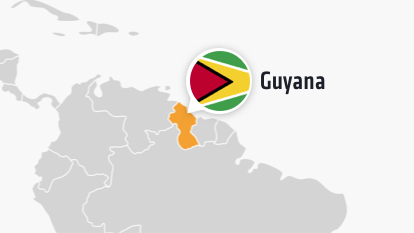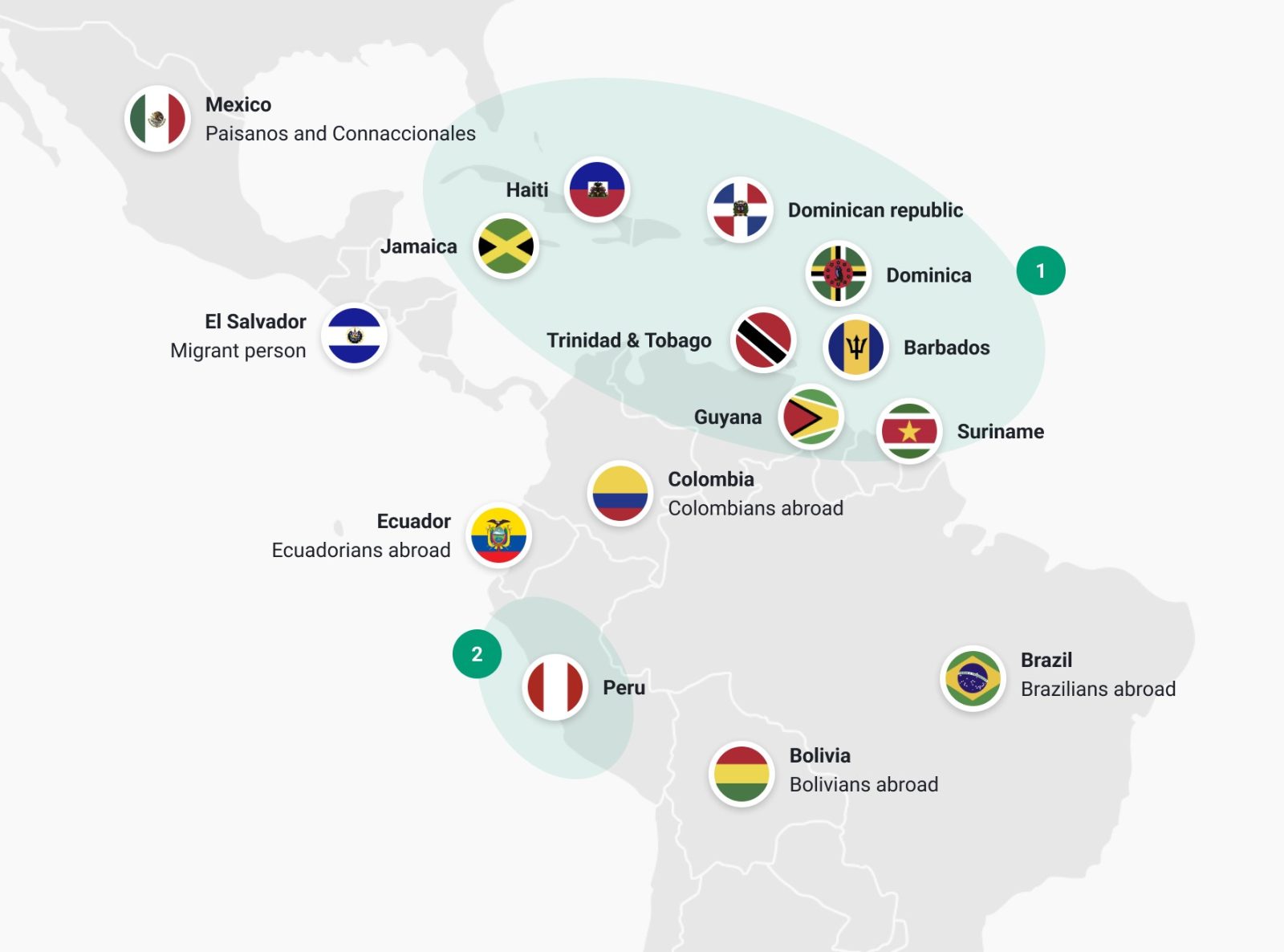Latin America & the Caribbean
This page provides an overview of diaspora engagement in Latin America & the Caribbean (LAC). It draws on knowledge gathered during the mapping of 24 countries to study relevant policy and institutional frameworks, trends, good practices and recommendations at regional level. A long-form version of this regional overview is available to download in English and Spanish.
At the regional level, emigration is an area of primary interest. Although no regional framework properly focuses on either migration or on diaspora engagement, interest is visible at national level: 14 of the 24 countries mapped have a diaspora-related institution, only one country (Dominica) has a diaspora engagement policy, though Jamaica and Guyana are in the drafting process. According to the Emigrant Policies Index (EMIX) framework to analyse the “degree of adoption” of emigrant policies, there are substantial disparities in the 22 countries analysed as to the adoption of policies that are intended to maintain economic, political or social links with migrants.
A few attempts have been made to increase regional cooperation, including the Quito Declaration to promote exchange and dialogue, and the Ibero-American Multilateral Agreement on Social Security. However, these efforts remain marginal.
One regional initiative to watch is a regional policy initiated by CARICOM’s Regional Nursing Body with the aim of addressing ‘brain drain’ in the health sector in the Caribbean.
Dominica is the first and only country in the region to adopt a diaspora engagement policy. Established by the Ministry of Trade, Employment, Industry and Diaspora, the Diaspora Policy focuses on the Dominican diaspora and recognises its ability to contribute meaningfully to the country’s social and economic development.
The Pacific Alliance of Chile, Colombia, Mexico and Peru (created in 2011), launches a programme of shared embassies and opens several to strengthen their global presence and provide services to their diasporas, whilst sharing operating costs.
The Quito Declaration was adopted at the 2016 meeting of Heads of States and Governments of the Community of Latin American and Caribbean States (CELAC). This declaration underlines the need to support the possibility of promoting exchanges, cooperation and dialogues with the diaspora, in accordance with the guidelines set forth in the Plan of Action for the Decade for Persons of African Descent in the Americas (2016-2025). This declaration, however, does not include all diasporas in LAC – or diasporas from the region – as it only focuses on Afro-descendants and mainly relates to their integration.

Although it does not have a diaspora engagement policy per se, the Mexican government has a very comprehensive approach to its diaspora at federal and state levels, with diaspora engagement evident in a variety of official efforts, including laws, norms and institutions.
Some interesting local initiatives can be highlighted, such as the replication of the federal “Programa 2×1” in the State of Zacatecas. Mexico also runs a few programmes to encourage the diaspora to return, whether permanently or not, such as the Paisano Guide (Housing for Mexicans Living Abroad) and “Build in your homeland”.

Jamaica has made progress in policy initiatives to expand on inclusivity and development of the diaspora population, as well as to bridge relationships between diaspora youth populations and Jamaicans living on the island. The Global Diaspora Youth Council was created in 2019 to sustain these connections. The Ministry of Foreign Affairs and Foreign Trade has made it a priority to develop boards and commissions that focus on the diaspora population. Ultimately, the government encourages members of the diaspora to return home to work, raise families, invest, and retire.
Jamaica is currently drafting a fully-fledged diaspora engagement policy.

In 2011, as a result of the Guyanese government’s recognition of the important role the diaspora can play in national development and diaspora potential to fill human capital gaps, a Diaspora Unit was created within the Foreign Affairs Ministry. The Unit liaises between the diaspora and the government, collects information about the diaspora and maintains relations with diaspora leaders.
Guyana is currently drafting a fully-fledged diaspora engagement policy.
In the LAC region, there are two main groups of terminology, ‘diaspora’ is dominant mostly in the island states as well as a few other countries (see 1 and 2), whilst most states on the continent refer to ‘nationals abroad’.

Support in terms of capacity building and access to funding should be provided to organisations to enable them to better structure themselves. Better structured diaspora organisations would provide interlocutors for governments which could be conducive to fostering dialogue.
These are effective ways to further develop the capacities of institutions and diaspora organisations dealing with diaspora engagement.
It would be interesting for both governments and diaspora organisations to exchange with peers based in other regions of the world where diaspora engagement is more advanced (i.e. Africa). In addition, thematic exchanges should be developed with a view to creating thematic networks across regions.
In many cases, in LAC, the policy framework related to diaspora engagement is insufficient. Support should be provided to identify policy frameworks that have already been successfully applied to inform the design of national policies. Moreover, support should be provided to policymakers to facilitate effective implementation of policies and programmes.
Access to funding should be made easier for all stakeholders and more funding should be made available specifically for diaspora engagement initiatives.
Take local realities and the diversity of diaspora interests and priorities into account in order to design capacity development programmes that will gain traction. Co-designing programmes is a good way to achieve this whilst also creating ownership and buy-in from the different stakeholders involved.
Diaspora engagement policies and practicies do not need to be standardised and technical support should not seek to do so.